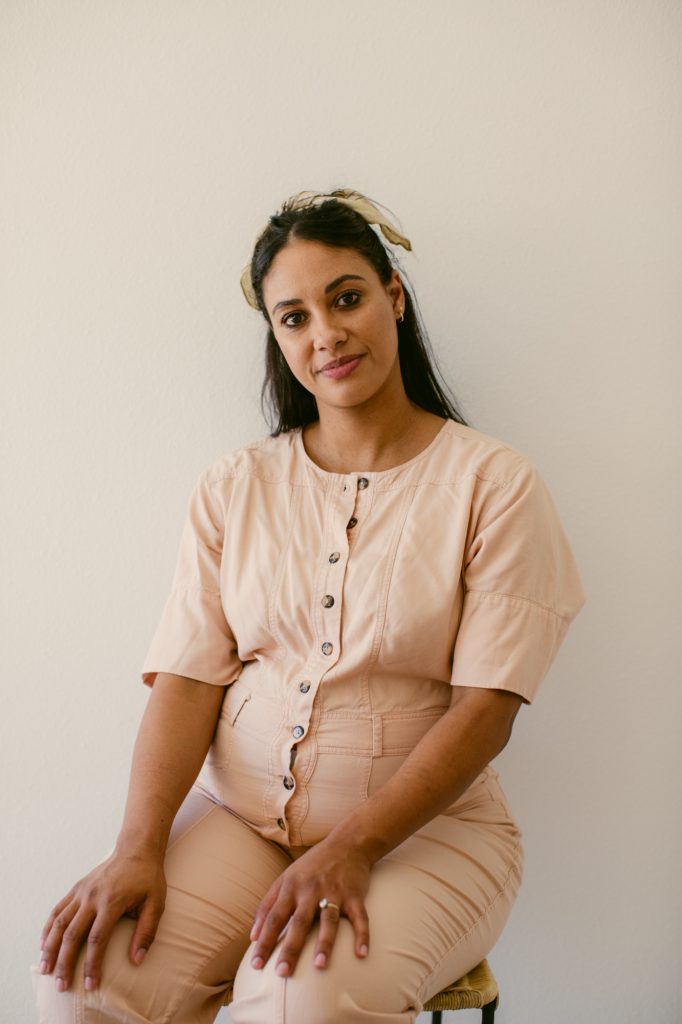Two days after having given birth, I had a photo shoot scheduled. My house was in shambles, literally. We had just moved in, the master bedroom was still under construction, and we were all living in the guest bedroom. I had been on bed rest for both of my back-to-back pregnancies. I hadn’t worked out in almost two years, and if you’ve ever been on bedrest you know just how quickly you lose muscle mass.
Still, I was so proud of the fact I had created healthy babies against all odds. I remember thinking that I didn’t care how my body looked. I was going to keep it real and thank my body for all the work it had done.
Fast forward a few weeks. I received the photos, and let me tell you, I was too vain to even post a few of the images that felt anything but flattering.
I grappled with it these feelings for more hours than I would like to admit, ultimately deciding to crop my torso out of the images. So much for my unconditional self-love. But what does it truly mean to practice radical self-love? Not to mention, how do we find our way back to ourselves postpartum, when the truth is most of us feel anything but sexy after giving birth?
What Is Radical Self-Love?
Radical self-love is a relatively new term. It’s very different from the bounce-back era when women felt they had to get back to their pre-baby bodies as fast as possible. Not to mention juggling all of the daily tasks having a newborn brings. A 2014 review of body image and pregnancy found that, despite the immense pressure women feel to “bounce back” after pregnancy, there is little support and even less research exploring the scientific impact of pregnancy on body image. The review ultimately determined that body dissatisfaction in pregnancy is often associated with “low mood, perceived socio-cultural pressure, intention to breastfeed and eating restraint.”
Enter radical self-love. Radical self-love is defined as our inherent state of being as worthy and enough. It is the unobstructed access to our highest selves. In this era, women have been trying to embrace a much healthier approach to loving their new bodies post-baby. Women such as Ashley Graham and Amy Schumer have even begun sharing the unapologetically real images of their postpartum bodies to normalize them.
Okay, I know. Easier said than done right?! Well, start with your thinking, and let’s go from there. Here are a few steps to get you on the path to radical self-love and your sexy self.

*Sidenote: this is the photo!* Photo by Zachary Gray
5 Steps for Radical Self-Love Postpartum:
- Check-in with your body.
Really asking yourself “how do I feel?” and what might you need to feel better is so crucial. More often than not, this is simply time. Giving birth is a big deal and incredibly hard on the body. Did you know that once you’ve expelled the placenta, there is a wound the size of a dinner plate on your uterus?! Make sure you listen to your doctors, doulas, and midwife on proper postpartum care and rest. - Ask for support.
If something feels off with your body or mental state make sure you ask for help. Self-love means being vulnerable enough to get the help you need. Whether it’s a nap or a pelvic floor specialist make sure you speak up for your needs. MyNestwell is a wonderful resource for postpartum practitioners. It’s as they say, “it takes a village to raise a mother.” - Practice gratitude and loving self-talk.
Powerful thoughts and words bestow powerful love. Rick Hanson, Ph.D., is a psychologist, senior fellow of the Greater Good Science Center at UC Berkeley, and New York Times bestselling author. He speaks and teaches at length about Neuroscience and Contemplative Practice and the power of positive thought. - Make time to find the new version of yourself once you’re out of the weeds.
Connect with your passions again. Make a list of the experiences you miss most from your pre-baby routine. Then consider how you might realistically incorporate some adapted version of them into your life today:
- What beneficial activities (for example, getting a haircut or cooking a healthy meal) have you stopped doing?
- Which friends have you stopped seeing?
- What are the ways you used to connect with your partner?
- How did you set up your daily routine or outline goals at work?
- What seemingly nonessential rituals (such as watching your favorite TV show) used to help you decompress?
- Consider intuitive eating.
This mindfulness-guided approach to food may help postpartum women with healthy weight management. It’s also important to find some type of exercise that works for you. Remember, it’s not always about losing weight. It’s about building these endorphins and taking time for your mental and physical self. Psychology Today published a study about the antidepressant power of aerobic exercise that I found really interesting. - Do what makes you feel sexy not what others tell you is sexy.
Defining sexy is up to you. I know I feel most sexy when I’m feeling mentally and physically confident. Sometimes I feel the sexiest when I accomplish a goal. Lately, the only time I feel sexy is when I’ve had a shower and a good night’s sleep. Sexy feels different for everyone and you can’t be sexy for someone else if you don’t feel sexy for yourself. (Can I get an amen up in here?!)
I often wonder what we would put ourselves through if it meant our children would have to experience the same things. In reality by putting ourselves last, ignoring our passions, talking down to ourselves and our bodies we are modeling the behavior for our children to follow. Normalizing healthy radical self-love behaviors ultimately encourage it.
If we choose radical self-love modeling and practicing these steps we will normalize self-love.






